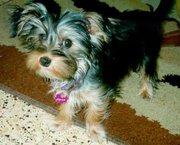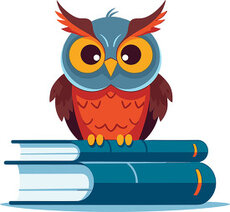Yorkshire Terrier
|
|
| Yorkshire Terrier | |||||||||||||||||
|---|---|---|---|---|---|---|---|---|---|---|---|---|---|---|---|---|---|
Missing image Gabby.JPG A Yorkshire Terrier. | |||||||||||||||||
| Common nickname | |||||||||||||||||
| |||||||||||||||||
| Country of origin | |||||||||||||||||
| United Kingdom | |||||||||||||||||
| Classification and breed standards | |||||||||||||||||
|
The Yorkshire Terrier, also known as a Yorkie, is a breed of small dogs, one of many toy dog breeds. Yorkies can be very small indeed, usually not weighing more than about 5 or 6 pounds (less than 3kg.)
| Contents |
Appearance
The breed standard calls for a long, blue and tan coat that hangs straight and parts down the middle. However, many yorkies do not conform directly to the stardard. Some coats are black or grey on the body. Brown and gold on the faces and legs is most common. The fur in a show dog is usually straight and can grow very long. Yorkies can also have somewhat wavy fur, although clubs do not recognize this variation for dog shows. In either case, Yorkie fur is soft, fine, and high-maintenance, and must either be trimmed short or washed and brushed frequently.
Temperament
The Yorkshire Terrier, though a Toy Breed, still retains much of its Terrier ancestry in terms of personality. Though personalities differ from dog to dog generally Yorkies are Intelligent, Independent and Spunky. Yorkies, especially males, are very territorial and are known for their disregard for the limitations of their own size. They will often attack much larger dogs despite their extreme size disadvantage.
Yorkies typically get along well with cats or other dogs, and love to play together in groups. However, they are still terriers, and even an old, sedentary lap dog will eagerly hunt rodents. Because they are so small, they are easily injured, so while they will get along very well with children, it can be dangerous for the Yorkie to keep it in a house with small or abusive children. Also, despite their small size, if continually provoked or if attacked, like all dogs, they pack a surprisingly powerful bite.Yorkies may seem rather vapid and unintelligent at times (perhaps due to their yapping and playfulness), but they can easily be trained to perform simple tasks.
Health
Yorkies tend to develop cataracts in their old age, but their small size limits the effects of conditions such as arthritis. There is also the possibility of Trachea collapse, the cause of which is thought by many to be genetic. As with many purebred dogs, the Yorkshire Terrier is prone to certain genetic disorders. Most common is the liver shunt (portosystemic shunt). In this condition some of the dog's blood bypasses the liver and as such does not get cleaned of those toxins that the liver is responsible for removing. A Yorkie with this condition might exhibit some or all of the following symptoms: small stature, poor muscle development, behavioral abnormalities, unresponsiveness, seizures, and so on. However, if treated by a veterinarian, in time, the condition is most often reversible.
History
Most believe that the Yorkshire Terrier is the product of comingling Scottish and English terriers when many Scots were displaced by the Industrial Revolution and settled in England. Though pedigrees are not available for the first Yorkshire Terrier ancestors, several breeds have been suggested including (for the Scotish contribution) the Waterside Terrier, the Clydesdale Terrier, and the Paisly Terrier. English contributions to the bloodline of the Yorkshire Terrier may have included, according to many sources, the Manchester Terrier, the Maltese, and the Dandie Dinmont Terrier.
The original Yorkshire Terrier, known as the "Broken-Haired Scotch Terrier" was a 12-to-14 pound dog with wire hair whose intended purpose was the catching of rats and other vermin that lived in small spaces.
In 1870, the breed was renamed the Yorkshire Terrier, after the town of Yorkshire, England where the breed is believed to have originated. The father dog of the breed is considered to be Huddersfield Ben, who was born in 1865, the inbred offspring of a mother and son. Huddersfield Ben was bred by Mr. W. Eastwood Huddersfield, who died in 1871. A multiple champion, Huddersfield Ben set the foundation for what would develop into the modern Yorkie.
Dog Pictures and Clipart
- Pictures of Dogs (http://classroomclipart.com/cgi-bin/kids/imageFolio.cgi?direct=Animals/Dogs)
- Dog Clipart (http://classroomclipart.com/cgi-bin/kids/imageFolio.cgi?direct=Clipart/Animals/Dog_Clipart)
Clipart and Animal Pictures
- Clipart (https://classroomclipart.com/image/category/clipart.htm)
- Animal Clipart (https://classroomclipart.com/image/category/animal-clipart.htm)
- Animal Animated Clipart (https://classroomclipart.com/clipart/Animations/Animals.htm)
- Pictures of Animals (https://classroomclipart.com/image/category/animal-photos.htm)
- Amphibian Clip Art, Pictures and Photogaphs (https://classroomclipart.com/image/category/amphibian-clipart.htm)
- Farm Animal Clip Art, Pictures and Photographs (https://classroomclipart.com/image/category/farm-animal-clipart.htm)
- Mammal Clip Art, Pictures and Photographs (https://classroomclipart.com/image/category/mammal-clipart.htm)
- Marine Animal Clip Art, Pictures and Photographs (https://classroomclipart.com/image/category/marine-life-clipart.htm)
- Reptile Clip Art, Pictures and Photographs (https://classroomclipart.com/image/category/reptile-clipart.htm)
- Spider Clip Art, Pictures and Photographs (https://classroomclipart.com/image/category/spider-clipart.htm)



